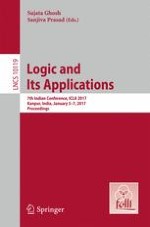2017 | OriginalPaper | Chapter
Deriving Natural Deduction Rules from Truth Tables
Authors : Herman Geuvers, Tonny Hurkens
Published in: Logic and Its Applications
Publisher: Springer Berlin Heidelberg
Activate our intelligent search to find suitable subject content or patents.
Select sections of text to find matching patents with Artificial Intelligence. powered by
Select sections of text to find additional relevant content using AI-assisted search. powered by
